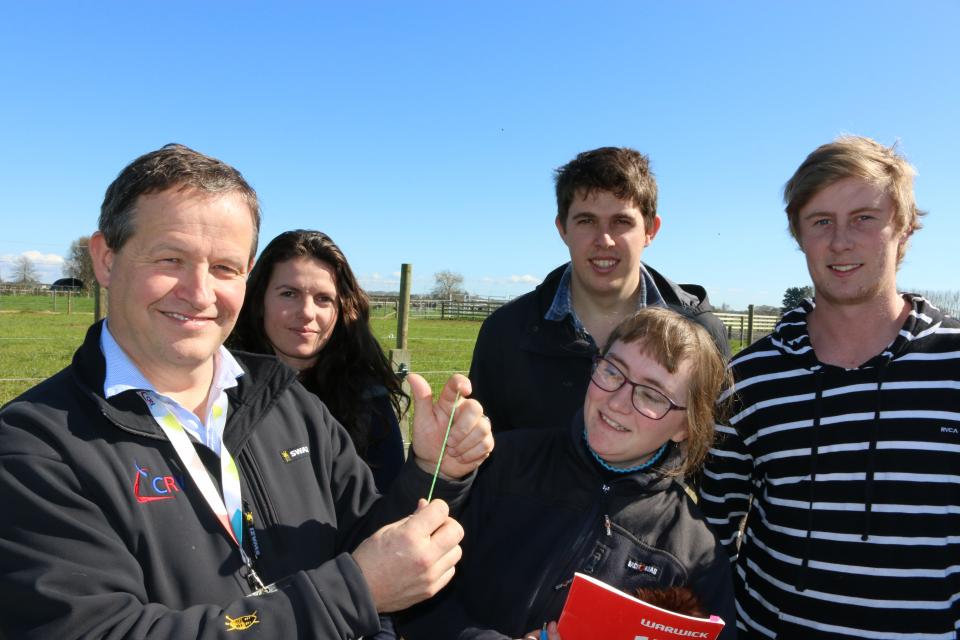CRV Ambreed recently gave Lincoln University students a rare look behind the scenes at its Bellevue Production and Logistics Centre on the outskirts of Cambridge.
The centre recently got the green light to export straws of semen to the European Union (EU) following an official audit, CRV Ambreed operations manager Andrew Medley told the 41 students during their August tour.
This accreditation makes Bellevue one of only two such approved locations in New Zealand and one of the best bull semen collection and processing facilities in the Southern Hemisphere.
“It’s essentially given us a passport to the European market. It has increased opportunities for CRV Ambreed in the UK and Ireland. As farming systems change there’s potential for New Zealand genetics to go into other dairy markets in Europe,” Andrew said.
But it’s not only the EU that benefits from CRV Ambreed’s achievement.
“Within New Zealand the farmer can be sure that CRV Ambreed bulls meet some of the most stringent rules imposed on semen trading internationally,” Andrew said.
The Bellevue Production and Logistics Centre is a red line facility – that means no one can enter the site without strict controls. The Lincoln University students were able to witness staff at work from especially designed vantage points without crossing the red line.
Andrew explained CRV Ambreed’s breeding philosophy and breeding programme design which involves partnering with the country’s top breeders to source the best bull calves to enter the formal progeny test programme.
“Our breeding programme is all about improving genetic gain,” Andrew said.
“Our role is to provide the products and services to enable the farmer to get their cows in calf to ensure the elite genetics will be in the milking herd in three years’ time. Each year we bring in 120 yearling bulls into our progeny testing (PT) programme selected from 1500 bulls offered to us. Those 1500 bulls go through an intense selection process that measures their genetic quality using genomic selection technology to help identify the elite bulls that end up in the PT programme.”
The Lincoln University students watched, from behind a glass viewing platform, the collection of semen.
“Some of these bulls are being collected 50 weeks of the year, twice a week, with the capability of producing 100,000 to 120,000 straws,” said Andrew.
And, from another viewing platform looking down on the laboratory, the students saw the high tech system used for the management of the semen. The semen is processed in a semen extender, injected into hundreds of straws, each labelled to correctly identify the sire and then frozen down before being stored in liquid nitrogen at a temperature of minus 196 degrees celsius.
CRV Ambreed also exports NZ grazing genetics in significant volumes to the USA, South America, South Africa and Australia.
“That’s quite a big thing for New Zealand dairy farmers, when they see their product going offshore,” Andrew said.
Bachelor of Agricultural Science students Abigail Jones, of Karamea, and Chris Beatson, of Darfield, felt fortunate to see artificial insemination theory in practice.
“Seeing it puts what we’ve learned at university into real-life perspective,” Abigail said.
Chris, son of CRV Ambreed genetic development strategist Phil Beatson, was excited to see the new centre having visited the old one.
“The Bellevue site is pretty impressive,” Chris said. “There’s a lot of interest in this work.”
Bachelor of Commerce (Agriculture) students Grace Woolnough, of Mangawhai, and Duncan Bridgman, of Christchurch, were grateful CRV had included viewing spots in the design of the facility so visitors could look behind the scenes.
“I thought it was pretty fabulous, having these places where you can watch things from,” said Grace,
“It’s pretty impressive,” added Duncan. “There’s a lot of technology in there and room to add to it when new technology comes along.”
EU auditors will visit the Bellevue site every six months, to ensure it continues to meet all standards on an on-going basis.


